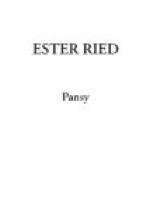Dr. Van Anden was tramping about in his room, over the side piazza, a very unusual proceeding with him at that hour of the day; his windows were open, and he was singing, and the fresh lake wind brought tune and words right down to Ester’s ear:
“I would not have the restless will
That hurries to and fro,
Seeking for some great thing to do,
Or wondrous thing to know;
I would be guided as a child,
And led where’er I go.
“I ask thee for the daily strength,
To none that ask denied,
A mind to blend with outward life,
While keeping at thy side;
Content to fill a little space
If thou be glorified.”
Of course Dr. Van Anden did not know that Ester Ried stood in the doorway below, and was at that precise moment in need of just such help as this; but then what mattered that, so long as the Master did?
Just then another sense belonging to Ester did its duty, and gave notice that the pies in the oven were burning; and she ran to their rescue, humming meantime:
“Content to fill a little space
If thou be glorified.”
Eleven o’clock found her busily paring potatoes—hurrying a little, for in spite of swift, busy fingers their work was getting a little the best of Maggie and her, and one pair of very helpful hands was missing.
Alfred and Julia appeared from somewhere in the outer regions, and Ester was too busy to see that they both carried rather woe-begone faces.
“Hasn’t mother got back yet?” queried Alfred.
“Why, no,” said Ester. “She will not be back until to-night—perhaps not then. Didn’t you know Mrs. Carleton was worse?”
Alfred kicked his heels against the kitchen door in a most disconsolate manner.
“Somebody’s always sick,” he grumbled out at last. “A fellow might as well not have a mother. I never saw the beat—nobody for miles around here can have the toothache without borrowing mother. I’m just sick and tired of it.”
Ester had nearly laughed, but catching a glimpse of the forlorn face, she thought better of it, and said:
“Something is awry now, I know. You never want mother in such a hopeless way as that unless you’re in trouble; so you see you are just like the rest of them, every body wants mother when they are in any difficulty.”
“But she is my mother, and I have a right to her, and the rest of ’em haven’t.”
“Well,” said Ester, soothingly, “suppose I be mother this time. Tell me what’s the matter and I’ll act as much like her as possible.”
“You!” And thereupon Alfred gave a most uncomplimentary sniff. “Queer work you’d make of it.”
“Try me,” was the good-natured reply.
“I ain’t going to. I know well enough you’d say ‘fiddlesticks’ or ‘nonsense,’ or some such word, and finish up with ’Just get out of my way.’”
Now, although Ester’s cheeks were pretty red over this exact imitation of her former ungracious self, she still answered briskly:




